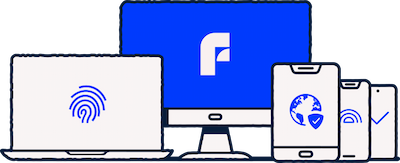- Products
- Renew
- Articles
- Support
- Free tools
- F-Secure Text Message CheckerCheck with AI if a text message is a scam
- F‑Secure Online Shopping CheckerCheck for free if a website is safe to buy from
- F‑Secure Identity Theft CheckerCheck if your personal information has been part of a data breach
- F‑Secure Strong Password GeneratorCreate strong passwords for free
- F‑Secure IP CheckerCheck your IP address and location
- F‑Secure Online ScannerScan and clean your PC for free
- F‑Secure Router CheckerIs your internet connection safe?
- View all free tools
- Scam protection
- My F‑Secure
8 cyber security tips for remote work
Cyber security at home office is often up to you. But how to tackle the challenges? Read our tips for secure remote work below.


Secure your home office and remote work
Cyber security at home office is more up to you, whereas someone else usually takes care of it at the office. Even if you are using a computer provided by your employer, there still are measures that are left to you. The following 8 tips help you enjoy working from home securely.

1. Use antivirus software
There’s no way around it, you just need to have it to work safe. Start improving your cyber security for remote work by getting antivirus software on your computer. Prevent malware from compromising your work and your employer’s systems.
2. Make sure your system and programs are up to date
Programs and operating systems are updated regularly to improve their security. Make sure your operating system is running the latest version. Enable automatic updates to secure your systems. If your employer’s system asks you to install updates, it’s good to do that as soon as possible.
3. Pay attention to Wi‑Fi and network security
Whether you use your employer’s devices or not, securing your home network is up to you. Improve your home office security by protecting your network. If your Wi‑Fi requires a password, that’s a good start. If not, access your router settings to change this. To access your router settings, find the IP address that’s written on the router and type it in your web browser and sign in.
Also change your router’s default password. Default passwords are often known by hackers, so they are vulnerabilities in Wi‑Fi and network security. If you have never done it, change it immediately. An attacker could get access to your devices and your web traffic through the router.
4. Secure your privacy with a VPN
If you are using your own computer for remote work, get a VPN to secure your connection and encrypt your data. With VPN, your web traffic can’t be accessed by anyone you don’t want to. Use VPN always to improve the security of public Wi‑Fi networks.
5. Avoid oversharing your screen
During online meetings, be cautious when sharing your screen. If possible, don’t leave any windows open that you don’t want to share. Accidents do happen. While it can be awkward, it’s also a privacy issue. You might accidentally share content that is not meant to be viewed by others.
6. Beware phishing scams
Phishing scams aimed to steal personal details and login credentials are regularly sent to work emails. If you get emails with any suspicious links or attachments don’t open them. Better safe than sorry. If your employer’s email system has a way to report phishing emails, use it.
7. Don’t share personal information in messages or social media
Don’t share any personal information on messages or emails. It could be just another case of phishing. If asked for your personal information, ensure that the request was legitimate before sending any.
It’s also a cyber security risk to share pictures of your remote work equipment in social media. You might accidentally share important information. Same goes with using your webcam. With webcams you might also risk the privacy of your family members.
8. Create a good working environment
Ergonomics might not be the first thing in mind when thinking about cyber security and remote work. But anything that might disturb your concentration can make you more vulnerable to scams and opening malicious content. For the same reason, remember to take breaks.

Get all the home office security you need in one package
F‑Secure Total is all the protection you need to secure your remote work. Total includes an award-winning antivirus, an easy-to-use VPN, and a handy password manager. Made by a veteran cyber security provider with over 30 years of experience, your protection is in good hands. Try Total free for 30 days, with no credit card required.













